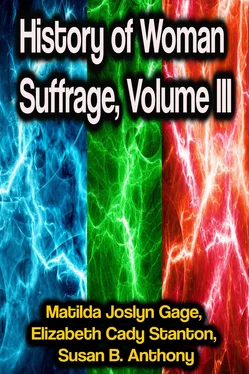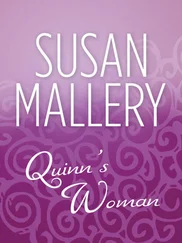Lydia E. Becker.
Yours truly,
Boston, Mass., January 10, 1877.
Dear Mrs. Stanton: It is with some little pain, I confess, that I accept your very courteous invitation to write a letter for your Washington convention on the 19th instant; for what I must say, if I say anything at all, is what I know will be very unacceptable—I fear very displeasing—to the majority of those to whom you will read it. If you conclude that my letter will obstruct, and not facilitate the advancement of the cause you have so faithfully labored for these many years, you have my most cheerful consent to deliver it over to that general asylum of profitless productions—the waste-basket.
Running this risk, however, I have this brief message to send to those who now meet on behalf of woman's full recognition as politically the equal of man, namely: that every woman suffragist who upholds Christianity, tears down with one hand what she seeks to build up with the other—that the Bible sanctions the slavery principle itself, and applies it to woman as the divinely ordained subordinate of man—and that by making herself the great support and mainstay of instituted Christianity, woman rivets the chain of superstition on her own soul and on man's soul alike, and justifies him in obeying this religion by keeping her in subjection to himself. If Christianity and the Bible are true, woman is man's servant, and ought to be. The Bible gave to negro-slavery its most terrible power—that of summoning the consciences of the Christians to its defense; and the Bible gives to woman-slavery the same terrible power. So plain is this to me that I take it as a mere matter of course, when all the eloquence of the woman-suffrage platform fails to arouse the Christian women of this country to a proper assertion of their rights. What else could one expect? Women will remain contented subjects and subordinates just so long as they remain devoted believers in Christianity; and no amount of argument, or appeal, or agitation can change this fact. If you cannot educate women as a whole out of Christianity, you cannot educate them as a whole into the demand for equal rights.
The reason of this is short: Christianity teaches the rights of God, not the rights of man or woman. You may search the Bible from Genesis to Revelations, and not find one clear, strong, bold affirmation of human rights as such ; yet it is on human rights as such—on the equality of all individuals, man or woman, with respect to natural rights—that the demand for woman suffrage must ultimately rest. I know I stand nearly alone in this, but I believe from my soul that the woman movement is fundamentally anti-Christian , and can find no deep justification but in the ideas, the spirit, and the faith of free religion. Until women come to see this too, and to give their united influence to this latter faith, political power in their hands would destroy even that measure of liberty which free-thinkers of both sexes have painfully established by the sacrifices of many generations. Yet I should vote for woman suffrage all the same, because it is woman's right.
Francis E. Abbot.
Yours very cordially,
Washington, D. C., January 16, 1877
My Dear Friends: I thank you for your generous recognition of me as an humble co-worker in the cause of equal rights, and regret deeply my inability to be present at this anniversary of your association. I tender to you, however, my hearty congratulations on the marked progress of our cause. Wherever I have been, and with whomsoever I have talked, making equal rights invariably the subject, I find no opposing feeling to the simple and just demands we make for our cause. The chief difficulty in the way is the indifference of the people; they need an awakening. Some Stephen S. Foster or Anna Dickinson should come forward, and with their thunder and lightning, arouse the people from their deadly apathy. I am glad to know that you are to have with you our valued friend, E. M. Davis, of Philadelphia. We are indebted to him more than all besides for whatever of life is found in the movement in Pennsylvania. He has spared neither time, money, nor personal efforts. Hoping you will have abundant success, I am, dear friends, with you and the cause for which you have so nobly labored, a humble and sincere worker.
Robert Purvis.
Oakland, Cal., January 9, 1877.
To the National Suffrage Convention, Washington, D. C.:
Our incorporated State society has deputed Mrs. Ellen Clark Sargent, the wife of Hon. A. A. Sargent, our fearless champion in the United States Senate, to represent the women of California in your National Convention, and with one so faithful and earnest, we know our cause will be well represented; but there are many among us who would gladly have journeyed to Washington to participate in your councils. Many and radical changes have taken place in the past year favorable to our sex, not the least of which was the nomination and election of several women to the office of county superintendent of common schools, by both the Democratic and Republican parties, in which, however, the Democrats led. Important changes in the civil code favorable to the control of property by married women, have been made by the legislatures during the last four years, through the untiring efforts of Mrs. Sarah Wallis, Mrs. Knox and Mrs. Watson, of Santa Clara county. In our schools and colleges, in every avenue of industry, and in the general liberalization of public opinion there has been marked improvement.
Laura DeForce Gordon,
Pres. California W. S. S. (Incorporated).
Yours very truly,
Mrs. Stanton's letter to The Ballot-Box briefly sums up the proceedings of the convention:
Tenafly, N. J., January 24, 1877.
Dear Editor: If the little Ballot-Box is not already stuffed to repletion with reports from Washington, I crave a little space to tell your readers that the convention was in all points successful. Lincoln Hall, which seats about fifteen hundred people, was crowded every session. The speaking was good, order reigned, no heart-burnings behind the scenes, and the press vouchsafed "respectful consideration."
The resolutions you will find more interesting and suggestive than that kind of literature usually is, and I ask especial attention to the one for a national convention to revise the constitution, which, with all its amendments, is like a kite with a tail of infinite length still to be lengthened. It is evident a century of experience has so liberalized the minds of the American people, that they have outgrown the constitution adapted to the men of 1776. It is a monarchial document with republican ideas engrafted in it, full of compromises between antagonistic principles. An American statesman remarked that "The civil war was fought to expound the constitution on the question of slavery." Expensive expounding! Instead of further amending and expounding, the real work at the dawn of our second century is to make a new one. Again, I ask the attention of our women to the educational resolution. After much thought it seems to me we should have education compulsory in every State of the Union, and make it the basis of suffrage, a national law, requiring that those who vote after 1880 must be able to read and write the English language. This would prevent ignorant foreigners voting in six months after landing on our shores, and stimulate our native population to higher intelligence. It would dignify and purify the ballot-box and add safety and stability to our free institutions. Mrs. Jane Grey Swisshelm, who had just returned from Europe, attended the convention, and spoke on this subject.
Belva A. Lockwood, who had recently been denied admission to the Supreme Court of the United States, although a lawyer in good practice for three years in the Supreme Court of the District, made a very scathing speech, reviewing the decision of the Court. It may seem to your disfranchised readers quite presumptuous for one of their number to make those nine wise men on the bench, constituting the highest judicial authority in the United States, subjects for ridicule before an audience of the sovereign people; but, when they learn the decision in Mrs. Lockwood's case, they will be reassured as to woman's capacity to cope with their wisdom. "To arrive at the same conclusion, with these judges, it is not necessary," said Mrs. Lockwood, "to understand constitutional law, nor the history of English jurisprudence, nor the inductive or deductive modes of reasoning, as no such profound learning or processes of thought were involved in that decision, which was simply this: 'There is no precedent for admitting a woman to practice in the Supreme Court of the United States, hence Mrs. Lockwood's application cannot be considered.'"
Читать дальше












